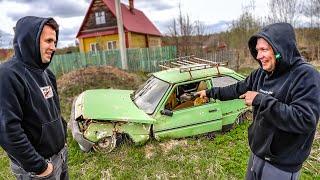Комментарии:

That, "This is Coffee" clip was wonderful. The comparison of procedural vs synergistic play is interesting. I guess that, to a certain extent, "OSR" is like "Grim-Dark"; you know it when you see it.
Ответить
Thanks for the video. I finished reading through my copy of OSE and reviewing PDF's of the 3 ODD booklets. Having played since 1977, I guess I did not get too deep into the complications and layers added in later additions. Especially Feats. So the game played at my table was never too far from the original game or B/X. I tried to keep combat exciting and fluid. For me, OSR is just back to basics.
Ответить
This really has me thinking and I agree with “C” - the procedural process does seem to be a link that connects what I think of as OSR and lends itself to many of the mantras of the “OSR movement” like rulings over rules and the story is what happens at the table. I feel like, for me, this is why I tend to not favor games that say they are OSR but bring in modern mechanics that remove some of the procedures. As always, great video.
Ответить
The term builds have origins in 3rd edition. Maybe? It's been a long time, so I'm not sure if I'm right about that. Definitely today, though, it's a BIG thing. Thoughts?
I agree with some of your procedural arguments for sure.

So...what is jazz?
Ответить
I don't think i will ever get my players to try OSR games because they like to character build. I blame videogames.
Ответить
This is a really interesting topic, and a well timed video - I’ve been thinking about this a lot recently. Things I see and read online have me thinking that my game is kind of OSR-lite.
There are spectrums between simulationism and gameism; between “pulp” and “epic” themes; between sandbox and a “known adventure path”. Then there’s a whole conversation around lethality and how deadly an OSR game should be.
The procedural/interactive mechanics you discuss are another one of these.
I’ve seen others in the comments bring up Rulings not Rules and this feels like a pretty solid mantra throughout all these variations on OSR.

I prefer are the Characters Super Heroes at Level 3 Yes/ No?
Can 1 Player Character at Level 3 wipe out an entire village? No then it is OSRish.
Recently I had a conversation with several 5e Players on how best to Subdue and Arrest a 7th Level Sorcerer.
They told me it was impossible even if the char - had all fingers chopped off, drugged, blindfolded, gagged with broken jaw, forced to wear headphones with loud music blasting 247, feet encased in cement, and hands tied behind their back. but but but the game is not broken. (rolls eyes)
So in the end
They forced the country to execute them all. There was no peaceful alternative.
Now I did have to send 3 million to take them down backed by a godling.
So now their characters ashes are scattered across 27 planets and 8 different stars. 2 million wish spells cast that they never come back or be reincarnated. Their Immortal Souls had been ripped into 52 pieces and fed to 104 different demons.
However they still insist their characters can recover. This is not over.
5e Players

A good and open minded reflection on the OSR. I was playing 5e (all the time) until a few months ago when I discovered B/X for the first time. It's so much better for my sandbox with 10 rotating players.
Ответить
Interesting thoughts on this, I think you might have something there!
Ответить
Just need to rant 🙃 when did this game turn into "I am the dungeon master" into "I am the player" and I want to play this class or race? People get pissed and leave games because they can't be half horse and half orc who does taxes. Thank you rant over
Ответить
Awesome differential classification discussion!
Subbed!

To use videogame parlance, OSRs can be more roguelike. Which is coming full-circle.
Ответить
There is only one way to define OSR. The game has to have been written in the 20th century or is a direct clone/derrivitive thereof. Mechanics and procedure have nothing to do with it, and in my opinion, this very view is watering down the OSR movement and can be our undoing. Your definition implies that I have to play B/X D&D in a specific style or it isn't really OSR.
You literally cannot write a "new" OSR. You can take a new spin on an old game, clean it up. But if it is less than 21 years old, you are using OSR as a marketing buzz.
Watching a bit more, this is just terrible. I regret clicking on this. No interactive mechanics in OSR? Does BX D&D not count as OSR? Reaction rolls? What about Traveler? White Wolf games? Or wait, though WW is old old stuff, it does not meet your strange definition of OSR.
There are random encounters in modern games.
I could not finish. This vid is to deeply biased.
Look, I am just gonna lay out a clear definition, agree or disagree, I do not care.
~Any and all games written in the 20th century are OSR
~No game written after the turn of the century can be considered OSR for at least another 10 years.
~Games that emulate or clone OSR games qualify as OSR. Old School Essentials or Swords & Wizardry.
~Games that mimic the imagined feel of OSR, as defined by their own subjective terms, are NOT OSR. They are pseudo OSR. Things like Dungeon Crawl Classics, Stars Without Number, Mork Borg, etc.

Interesting video Brother Hex. Could be an hour long discussion but I think you’re right...the “OSR” title has been diluted by now. Never fear tho...this RPG style is here to stay! 👍🏼
Ответить
I think the 'gripping hand' of OSR is 'keep the game moving'. Gygax would say stuff like 'okay, maybe you have a 1 in 4 chance to pull this off, roll a 1 or 2 on a d8 to succeed', which is fine for ad hoc rulings (although I'd like to think that for common situations, there can be standard rules that don't bog things down). Above all else, it kept the game moving. I could be wrong, of course. But it's a clear failure condition: If your indy game needs a 'session 0' focused on character creation, and you need to obey the 'five room dungeon' format because it takes a full 4+ hour session to get through five rooms, your game is not OSR, it's obviously at the Hasbro era of pacing.
I actually like the 'unified mechanic' concept that 3.x employed, I just think they used the wrong one. My own heartbreaker attempt is doing a unified mechanic that is approximately 2d6 + level + 'ability score bonus'. (Skills are based on level, essentially.) Since the top three results - 10, 11, and 12 - happen on a 1-in-6, I've got thresholds for 'this happens on a 1-in-6' and 'this only fails 1-in-6'. I'm also considering static scores, i.e. level + ability score, as guidelines for 'passive' interaction/communication, on a separate scale from active player decisions, but that's obviously going to be tricky.
The thing about combat is, the original highly abstract idea taken from wargaming? It gets weird as soon as human combatants start to get double-digit hit points. I'm not sure how to handle this. A minute of fighting should be enough to end most fights. I may end up doing three systems, one a blow-by-blow system intended for duels or perhaps times when each second matters, one a roll for a '10-15 second round' which is enough time for an entire phase of a fight (NPCs then make morale/judgment checks), and one for about a minute that decides the entire fight. Might model thousands of blow-by-blow fights to see how they tend to end up, so that the more abstract round and fight rolls are weighted correctly.

I do not like the "old school" label at all. It claims something being old, to be distinguished by something new. "Old", in turn, being so close to "outdated". It has become: 1. A marketing brand (rightly so, I guess) 2. Accompanied by pride here and there (so fruitless). Whereas "classic" would have been much more elegant, fertile, welcoming, promoting, elective: something classic is no more subject to the passage of time, hasn't sense to be challenged, is not in contest. As for "interaction vs procedure", I think it's a product of the meme "old school" itself. There's no conflict between the two. They might lack balance but it comes from how the people play. From the original game to 1st ed., the system included more procedural mechanics, no doubt! But it never prevented narrative and narrative ruling, which are things I guess people have always done much more than the OSR propaganda allowed to think so far. Of course many played with a lot of randomness and lethality, but my guess is that many more have always tried to balance towards the emergence of an experience much closer to S&S stories the game was conceived to deliver. That the old school systems (OD&D, Gygax, Cook, Moldvay, Mentzer, D. Cook) were used exclusively for procedural game is the myth that OSR used in order to emerge and the golden cage that keeps it at bay not allowing it to surpass more recent iterations, marketwise speaking. You describe pretty well how a certain based-on-sheet approach fails in delivering what classic systems allow so gently by not saturating sheets with stuff. To me the thing is called "prescription": classic systems are much more unprescripted.
Ответить
I don't use the wording osr. I just say Tsr and tsr relatable. Anything after that is wizard's rules. Everything from the first to the last game is rules on a book. How you play and how much fun your having is all that matters. Enjoy what you play.
Ответить
I never liked the procedural approach ... randomly rolled encounters in dungeons for example just ends up being really, well, random. The dungeons make no sense. However, the rules-light element I like. It makes the game run on a more abstract, theater-of-the-mind way. More modern game rules quantify everything to such a degree that people just play like "Well, my sheet doesn't say I can do it so ... I cast Arcane Blast" or whatever. Too many rules, too much complexity so it runs more like a video game and less like a thinking game.
Ответить
You are blathering a bit. I do this too. Skip to my last paragraph for the simple version.
OSR - is using the simple OSR mechanics and letting the game move. When done right it is like good jazz. The GM and players just playing -- not worrying about mechanics and the artificiality of complex rules but immersing into the the story, the play and the action.
The GM has the control and if they are smart they will make it easy and consistent. Its as easy as throwing a d6 for an action check with 1,2,3 being a failure and 4,5,6 being a success.
As an example. The party has walked into a rough stone cavern, which over the years has been carved by rising and settling waters. It has smooth and irregular walls. They are crowded by stalactites and stalagmites. These shine white in the torch light. At the far end of the cave a dark spot on the floor sits between flanking clusters of stalagmites risen from the floor.
As the party moves completely into the cavern the dark square becomes more clear. A wooden chest rotted and rusted forms from the dark spot in the torch light.
What do you do?
The party in a modern game will barely ask a question - "I am the thief/rogue (whatever) so I will check for traps."
As a GM in a OSR I encourage players to look things over and ask questions, then come up with a solution. Truth is you don't even need a thief class if you do it this way. The Original had Fighting-Men, Clerics and Magic-Users. That is all you really need in a fantasy game. Technically you don't even need that if you really have it on the ball. Just adventurers is all you need. The details will hammer out in the game narrative over time with some clever and simple help from the GM and Players.
So this is where OSR players start looking at this chest. Someone moves closer and they smell the rotting wood. It is moist and swollen around the rusted bands on the chest. There is a lock, corroded green holding the lid in place. Looking as though it was beginning to turn to stone from all of the build up on it.
They will try to see more and find creative ways to check for traps and I will give them responses that fit the situation. If it is something I actually do not know I roll a D6 to determine the truth and stick with it. Eventually they will either locate a trap (the chest does not have any mechanism for a trap - they won't find anything) tell me how they are disarming it and then they will describe how they open it. I will determine from what I know what will happen and if any roll needs to be made.
In this case there are mold spores on the inside of the lid. If the players slam the lid, the lock or the hinges with significant force the spores will be disturbed. When the lid is opened, if they are close (Within 5'), they will need to make a save vs. poison. If they are cautious and remove the lid gingerly, with the least amount of force, they will find the spores (undisturbed) and a ruby jeweled curved blade dagger in a silver scabbard sitting atop a small pile of ancient gold coins with strange runic characters on one side and a square hole in the middle of each.
The attempts to remove the lid are up to them. If they wisely brought an array of useful tools (which I always put on the equipment list) they have a very good chance of successfully removing the lid and not disturbing the spores. You do not need to be in the thief class to know how to use hand tools. I may give some advantage to a character with a background in working in a smithy, but not necessarily. Smart and observant questions are usually enough to get a +1 bonus on a d6 roll.
The game is fun when the GM and the players interact, not when the GM has to help calculate all the bonuses each character has and waits for a boring old roll.
Remember Raiders of the Lost Ark? The first bit where Indy was making his way through a trapped temple and trying to get the gold idol. It was exciting watching him try to get the idol without getting killed. A bunch of rolls are not the same as a description/interaction. Like trying to guess if you have enough sand in the bag before your swap it for the idol without triggering that trap you spotted when you asked the right question.
The Modern game, reducing these actions to a mere roll, have taken away the excitement. I know a GM can fix it, even in the modern system. But when you have so many players and GMs stuck on following some rather complex rules you lose the creativity and excitement. I play modern RPGs and many may as well be overly-complex wargame simulations the way most of them are run. No I was not in the Navy, I did not go to the Naval war college and I really do not see the need for simulating combat with a calculator and 10 rolls of the dice for one attack. I have more fun playing Full Thrust or De Bellis Antiquitatis (Simple miniature wargame rules) with my miniatures collection than some RPGs these days.
Modern Role-playing is more rules lawyering and less fun - the Hasbro/Wizards of the Coast, great grab for more cash every 7 to 10 years. It is great for DMs and Players with lots of disposable cash that want to play some crazy race with some crazy class and mega-bonuses up the wazoo. I prefer GMs and players who connect with that inner little kid who imagines and plays.
Just give me 3d6 and a d20 -- for each player. I can slap together simple rules for any genre based on Original D&D and make it fun for everyone. That is the real essence of OSR. Simple rules, creativity, interaction and fun. A GM/DM who is consistent and creative will have no problem running a game. Players who can wrap their heads around this are always welcome to play my games. Rules lawyers and power gamers can take a hike.

I've seen a lot of people in the comments talking about how "They can't get their 5e players into OSR". If you're having that problem I recommend checking out "5 Torches Deep" as it's SPECIFICALLY DESIGNED to be a middle ground between 5e and OSR rules. It is also modular so you can slowly go more and more OSR elements. The Questing Beast has a great video on it, though if you're into OSR at all you probably already know who The Questing Beast is lol
Ответить
Well put. Thx!
Ответить
Remarkably evenhanded for this discussion space. I personally like a mix of the two styles. I started in 1980 with the Basic Set, but I've toured through Traveller and Champions and a bunch of others since. And while I love a good hex crawl or dungeon delve, I also like interconnected narratives, which some (but not all) OSR module designers get rid of. I think, as creators and players, it's great that the toolbox is so big, and there's no need beyond personal taste to pledge allegiance to any particular set of tools. Great video.
Ответить
I’m a fan of straightforward rules that aren’t SUPER crunchy or have a “here’s a rule for literally everything.” For me it’s about two things: killing monsters and playing a character who’s quite different from myself irl. OSR has enough variety that it hits these two basic points extremely well. I’ll gladly take one 100-200 page book with everything I need over the 3 or 4 big 200-400 page books I’ll need for various different game systems.
Also, as for the modern sensibility of character builds, it’s not too big an issue for me. What matters to me is playing a character and having fun, builds tend to be these big sprawling lists of “here’s your skill trees and various spells and abilities you can get, etc etc.” sometimes I just wanna play a fighter and swing a big sword around :p I do like having a more “planned out” approach to character building of course, but it works far better in video games where I don’t need to worry as much, because the game handles half of it. So ya, OSR is something I love because of the variety of games (with especially a bunch that are nice and rules lite!), and the more weird stuff it can do with settings. I like my fantasy weird and alien!

I'm a TTRPG noob, and am really only into solo play. For context; where does something like Ironsworn land on this OSR scale?
Ответить
It really isn't clear what makes "you have an action and a bonus action and a reaction and you can do different things on each one, and fighters get an extra action" interactive but not "you have 5 saves and you use them for different ones and fighters get a starting Death save of 12," it mostly just seems like one is a rule you're familiar with so you "don't have to think about it" and the other isn't. Like yeah I agree that games like 3–5e have a high degree of systemic interaction but they're still *procedures*, procedures don't mean things that have a random chance of happening, which is maybe what you mean but that still doesn't seem like a useful way to delineate or define OSR games/play given that games like The Quiet Year and Apocalypse World have a high degree of randomness but no one would consider the former OSR and very few would even joke about the latter being one.
Ответить
This is one of the best descriptions that I've seen on YT of the difference in mindset between much of the 5e community and the broader roleplaying community.
I love 5e and have had a lot of fun playing it, but it does start to play like a MTG or war game once enough abilities, feats and spells come into play. Leaning too hard on rulings and not enforcing RAW or at least RAI in 5e will inevitably step on someone's toes because so much of the metagame is about roleplaying through clever use of the mechanics.
I prefer the more OSR style of "thinking off the sheet" as you say. Think about what makes sense in the world at the moment, tell your GM, and work with them to apply mechanics in a fair way.
This video earned my sub! Keep up the great work!

I want TRPGs to do things that other media can't. I don't want strategy that comes from numbers, stats or gamey mechanics because board games do that so well. I don't want a deep prewritten plot because novels and movies do that so well. I want the sort of extreme freedom that only a TRPG with a game master can provide. I want the dice and randomization lead the narrative dynamically to surprising places. I want the players to surprise the game master with their ingenuity. TRPGs should be exciting for both the players and game master.
Ответить
I disagree with you but this is a really well made video, good job
Ответить
I like to see the character sheet in OSR as a list of exceptions
Ответить
What is OSR in 2022?
Ответить







![[만월당] 선생님...저 정말 미칠것같아요 #민필름 전화점사 [만월당] 선생님...저 정말 미칠것같아요 #민필름 전화점사](https://hdtube.cc/img/upload/RUFSX0czaDE1U1Q.jpg)


















